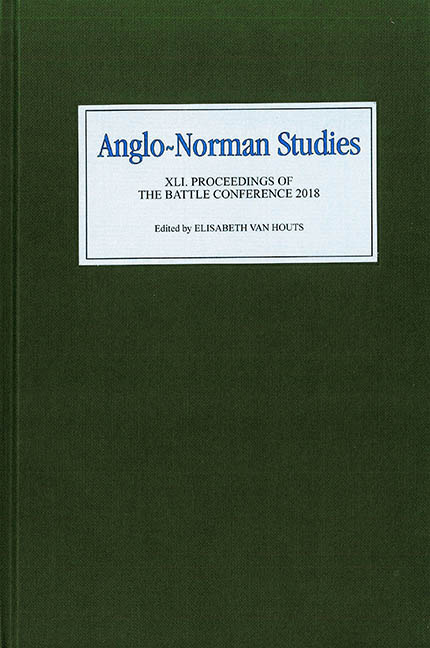Book contents
- Frontmatter
- Contents
- Illustrations and Tables
- Editor's Preface
- Abbreviations
- Horses, Knights and Tactics (The R. Allen Brown Memorial Lecture, 2018)
- Baldwin of Forde, Bartholomew of Exeter and the Authorship of the Liber de sectis hereticorum et orthodoxe fidei dogmata
- Evidence of the Ordinary: Wives and Children of the Clergy in Normandy and England, 1050–1150
- Anthropology, Feud and De obsessione Dunelmi
- New Archaeologies of the Norman Conquest
- An Angevin Imperial Context for the Amboise–Anjou Narrative Programme
- The Noble Leper: Responses to Leprosy in the Twelfth and Thirteenth Centuries
- Royal Taxation and Written Record in Eleventh-Century England and Ninth-Century West Francia
- Early Royal Rights in the Liberty of St Edmund (The Marjorie Chibnall Memorial Essay, 2018)
- Castle Construction, Conquest and Compensation (The Christine Mahany Memorial Lecture)
- Four Scenes from the Chanson de Roland on the Façade of Barletta Cathedral (Southern Italy)
- ‘The Jews are our Donkeys’: Anti-Jewish Polemic in Twelfth-Century French Vernacular Exegesis
- Miscellaneous Endmatter
Royal Taxation and Written Record in Eleventh-Century England and Ninth-Century West Francia
Published online by Cambridge University Press: 29 March 2020
- Frontmatter
- Contents
- Illustrations and Tables
- Editor's Preface
- Abbreviations
- Horses, Knights and Tactics (The R. Allen Brown Memorial Lecture, 2018)
- Baldwin of Forde, Bartholomew of Exeter and the Authorship of the Liber de sectis hereticorum et orthodoxe fidei dogmata
- Evidence of the Ordinary: Wives and Children of the Clergy in Normandy and England, 1050–1150
- Anthropology, Feud and De obsessione Dunelmi
- New Archaeologies of the Norman Conquest
- An Angevin Imperial Context for the Amboise–Anjou Narrative Programme
- The Noble Leper: Responses to Leprosy in the Twelfth and Thirteenth Centuries
- Royal Taxation and Written Record in Eleventh-Century England and Ninth-Century West Francia
- Early Royal Rights in the Liberty of St Edmund (The Marjorie Chibnall Memorial Essay, 2018)
- Castle Construction, Conquest and Compensation (The Christine Mahany Memorial Lecture)
- Four Scenes from the Chanson de Roland on the Façade of Barletta Cathedral (Southern Italy)
- ‘The Jews are our Donkeys’: Anti-Jewish Polemic in Twelfth-Century French Vernacular Exegesis
- Miscellaneous Endmatter
Summary
This paper explores Continental contexts for the understanding of taxation in eleventh-century England. The subject is widely recognized as important but fraught with difficulty. The central idea is the relevance of Carolingian practices of surveying and the keeping of written records for later Anglo-Saxon and Anglo-Norman government. Such a European perspective has been important for Anglo-Saxon historians: one thinks especially of the model emphasizing Carolingian influence on later Anglo-Saxon government advanced by James Campbell and Patrick Wormald. It has also been important for historians of Domesday, when one considers the comparative richness of the Carolingian administrative record, comprising the corpus of polyptychs, plus capitulary material indicating government interest in surveys and list-making. The Carolingian sources have been seen as the best comparanda for the two Domesday volumes and ‘satellite’ texts, as explored in classic studies by Campbell, John Percival, Henry Loyn and R. H. C. Davis. Are these indications of a shared early medieval culture of surveying and information gathering? There has been awareness that Anglo-Norman administrators came from a world familiar with polyptychs and certain legacies of Carolingian government, though ultimately commentators have placed more emphasis on the distinctiveness of the Domesday record.
One should stress the necessary limits of knowledge on this difficult subject. Firstly, one encounters the dominance of Domesday in the surviving English record. The use of shire and hundredal structures in 1086 is highly suggestive of some administrative continuity from Anglo-Saxon government, but how much should one envisage in respect of written documentation? It was generally harder for Anglo- Saxon material to survive. This is especially shown by particular forms of Anglo- Saxon document which we know to have been widespread, now attested in rare or unique instances, such as certain types of writ. Yet it remains difficult to assess silences. Secondly, the Carolingian material is relatively extensive, but heavily skewed towards documents produced and preserved by ecclesiastical houses. The existence of centrally kept records is strongly implied by capitularies but harder to demonstrate. One risks the danger of idealizing the practices of certain bishoprics and monasteries, but perhaps also of under-estimating forms of central control. The problems were aptly summarized by Campbell: ‘No one knows when (no one indeed really knows if) surveys ceased to be used by the Continental rulers; no one knows when English rulers began to use them.’
- Type
- Chapter
- Information
- Anglo-Norman Studies XLIProceedings of the Battle Conference 2018, pp. 135 - 154Publisher: Boydell & BrewerPrint publication year: 2019



